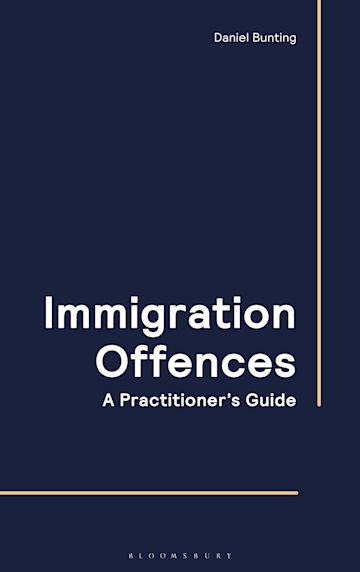Bloomsbury Professional Home
Immigration Offences
Q & A with Daniel Bunting
Daniel Bunting is the author of Immigration Offences.
This is included in our Immigration and Nationality Online Service.
How did you come to work in law and what drew you to practise in the areas of immigration and crime?
I studied maths at university and certainly didn’t have a plan to be a lawyer at that stage. After I graduated, I had a year out as a sabbatical officer in the Students’ Union as the Welfare and Equal Opportunities Officer. This exposed me to lots different areas of law, which was really fascinating, and whetted my appetite for more. I wasn’t sure what to do afterwards, but wasn’t ready to get a proper job, which led me to investigate converting to law (and kept the real world at bay for another couple of years).
Whilst I secured a criminal pupillage, I was always interested in immigration law (I later did an MA in History and Politics where I focussed on the history of immigration) and took the opportunity to do as many returns as I could from the members of chambers that did immigration.
How much awareness do you think there is amongst lawyers of the cross-over elements of immigration and crime?
Not much, and probably not enough. All areas of law have become ever more specialised over time. Whilst a hundred years ago someone could probably cover every area it is difficult now to be a true expert in anything but a very narrow field. If you look at the problems that have been caused by the (perhaps understandable) lack of understanding amongst criminal lawyers of the Refugee Convention and the meaning of ‘enter’ in immigration law, then it can be seen how tricky it can get.
What developments do you foresee happening in this area of the law over the next few years?
It will be an area that won’t stand still for sure. Obviously, we have had two major pieces of immigration legislation in the last 18 months (the Nationality and Borders Act 2022 (‘NABA’) and the Illegal Migration Act 2023 (‘IMA’)) that make fundamental changes to immigration and criminal law. The litigation on NABA is still ongoing and it is likely that there will be similar litigation as and when the IMA is fully brought into force.
In relation to the criminal law, the first cases under NABA have gone to the Court of Appeal but it is likely that there will be many more.
How can people invested in the issue of immigration offences stay ahead in such a fast-moving area of law?
There are no shortcuts unfortunately – it’s a question of accessing all the information you can. For example, set up Google alerts, have daily notifications from a law service (Westlaw/LexisNexis) on topics relevant to you, sign up to blogs (such as FreeMovement) or other content providers (Crimeline Law) and keep an eye on Twitter (or ‘X’ as it now is).
I’m a big fan of British and Irish Legal Information Institute (BAILII). If you log on every day, or every few days, then there will only be a small number of new cases which is a manageable amount. It won’t take long to flick through them and see which are of relevance to you.
What's the most important lesson you have learned whilst working in this field?
Nothing stands still for long. In the week leading up to me submitting the first draft of the book there was a significant development (government announcement, new case, or the like) that required a re-write every single day. It does mean that there’s always something new to learn.

